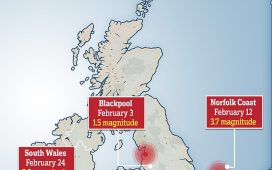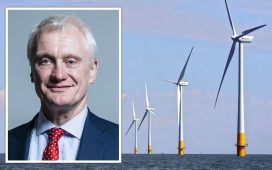[ad_1]
The outstanding Russian physicist Yuri Orlov, who has died aged 96, became one of the bravest champions of human rights in the final period of the Soviet Union. He suffered years of hardship in prison, labour camps and exile to Siberia before having his citizenship withdrawn in 1986 and being sent to the US as part of a spy swap.
Born in Moscow, Yuri came from a working-class family. His father, Fyodor Orlov, was a lorry driver who died when Yuri was eight. His mother, Klavdiya Lebedeva, brought him up in a village near Moscow. In 1944 he joined the Soviet army and served for two years before entering Moscow State University. In 1952 he joined the Institute for Theoretical and Experimental Physics, first as a postgraduate student and then as a researcher into quantum physics, concentrating on particle motion in accelerators.
His first clash with the authorities came at a meeting of the Communist party at the institute, where members were discussing the dramatic speech that Nikita Khrushchev had made in February 1956 to denounce crimes committed by Joseph Stalin. Although the focus of the meeting was critical of Stalin three years after the dictator had died, Orlov apparently went too far by describing Stalin and his security chief Lavrenti Beria as “murderers in power” and calling for the Soviet Union to practise “democracy on the basis of socialism”.
Orlov later recalled that he had two motives: one was to stop Soviet-style civilisation taking over the world, and the other was “my damn patriotism; I loved Russia and wanted her to be better”. He was sacked from the institute and expelled from the Communist party, but was lucky to be allowed to move to the Soviet republic of Armenia, where he was given a research post at the Yerevan Physics Institute. For the next 16 years he lived there, earning a doctorate, designing an electron-synchrotron (accelerating electrons and producing X-rays), becoming head of a laboratory and a professor, and being elected to the Armenian Academy of Sciences.
When pressures mounted on the dissident movement in Moscow in 1973 and particularly on the illustrious nuclear physicist Andrei Sakharov and the writer Aleksandr Solzhenitsyn, Orlov once again could not restrain himself. He returned to Moscow and wrote an open pro-democracy letter to the then Soviet leader Leonid Brezhnev, titled Thirteen Questions to Brezhnev. The letter was distributed through dissident circles as samizdat (self-published) material typed in multiple copies and passed around by hand. It called for major reforms in Soviet governance, including a lifting of censorship, known as glasnost (openness, which Mikhail Gorbachev would bring in a little more than a decade later).
In 1975, after Brezhnev, along with 34 other European heads of government plus the US, signed the Helsinki accords that committed them to respect freedom of speech, assembly and information, it was Orlov who had the idea of creating a citizens’ group in Moscow to monitor how the promises were fulfilled in the USSR.
He and his friends acted on the basis that the Soviet Union had probably only made a paper concession in the Helsinki documents, which also ratified the postwar borders of European states and promoted detente between east and west. It was important and lawful, the dissidents argued, to keep an account of human rights violations and press the Helsinki signatories and international advocacy groups to call out governments that committed abuses.
Orlov founded a Soviet chapter of Amnesty International and asked Sakharov to head a parallel organisation, the Moscow Group to Promote the Implementation of the Helsinki Accords. When Sakharov declined on the grounds that he preferred to act alone, it was inevitable that Orlov would be the leader. It was a risky assignment since the dissidents had decided to give their findings to western embassies and correspondents in Moscow.
To try to avoid inevitable arrest, Orlov lived virtually underground for several weeks in various empty flats. In 1977, after nine months in hiding, he was found by the authorities and convicted of “anti-Soviet agitation and propaganda”. He was sentenced to seven years of hard labour followed by five years of internal exile. In a camp in Perm in the Urals he was brutally treated, with periods of solitary confinement, before being moved to exile in Siberia in 1984 where he was allowed to live in a normal house.
In 1986 Orlov was released from exile, stripped of his citizenship, and put on a plane to the US as part of a complicated swap that also saw an American journalist released from prison in Moscow and a Soviet military officer released from prison in the US.
Orlov moved to Cornell University, where he remained for the next three decades apart from a brief stint at the European Organisation for Nuclear Research (Cern, 1988-89), where he helped to develop the idea of ion “shaking”, with consequent doubling of the number of accumulated anti-protons. At Cornell he worked on a physics megaproject to explore the origins of matter.
He continued teaching student seminars on physics and human rights until the age of 90. He was the author of 240 scientific papers as well as a memoir, Dangerous Thoughts: Memoirs of a Russian Life (1991).
Orlov’s first three marriages ended in divorce. He is survived by his fourth wife, Sidney, by three sons, Dmitry, Aleksander and Lev, from an earlier marriage, and by eight grandchildren and two great-grandchildren.
• Yuri Fyodorovich Orlov, scientist and human rights activist, born 13 August 1924; died 27 September 2020
[ad_2]
READ SOURCE





